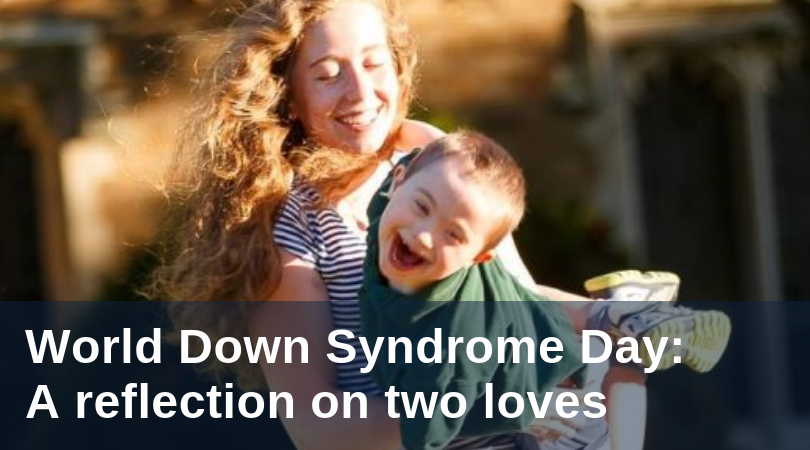
Once you know the reason that we celebrate World Down Syndrome Day on March 21st, you’ll likely never forget to commemorate the occasion. The date, 3/21, reflects the fact that Down syndrome is caused by a 3rd copy of the 21st chromosome. There is a playfulness about the naming of this day that belies the often very dire predictions that parents receive about their children when they are diagnosed with this condition. This playfulness is also evident in the way people with Down syndrome and their families celebrate this day. From wearing crazy socks to releasing this exuberant video, the hallmark of this day’s celebrations is joy.
A love that is unrestrained
What could the source of this joy be, so apparent to the Down syndrome community but overlooked by much of the world? It is tempting to speak sentimentally about people with Down syndrome as always happy, or as “angels”, but this denies the complexity of these individuals, and risks ignoring the real challenges and even deep suffering they and their families face. How then do we reconcile lives which may contain serious difficulties and challenges with the experience of these individual’s lives as as gifts, often very joyful ones?
There are of course the same ordinary joys which occur in all lives, but in my experience the common experience of uncommon joy often seen here stems from two related sources. Jean Vanier captured the first source when he wrote of those with cognitive disabilities that “their capacity for love is more immediate, lively and developed than that of other men.” We have indeed experienced this with my own son; he is no angel, but he loves us with the most simple, genuine love I’ve ever seen. This love overflows into his body with such force that he cannot restrain himself when showing his affection.
A love that responds to suffering
There are, however, some individuals with Down syndrome who suffer from more complex medical and behavioral problems which make it harder for them to express this love. To understand how these lives are still perceived as gift is to encounter the paradox of human suffering, not unique to those with disabilities, but certainly often found here. While it pains us deeply to see those we love suffer, at the same time it draws forth an even deeper love, and nowhere more so than when the one suffering is our child.
Pope John Paul II described this beautifully: “The world of human suffering unceasingly calls for, so to speak, another world: the world of human love; and in a certain sense man owes to suffering that unselfish love that stirs in his heart and actions.” It is this strong and unselfish love that, even when it seems unreciprocated, still allows the parent to see the child’s life as gift.
We all want to love and be loved like this
Last summer there was a video of a man with Down syndrome and his father that went viral. After leaving his 88 year-old widowed father for the first time, the son later flew into his arms at an airport. What struck me was not so much the tenderness of the scene, but the overwhelming reaction to it. A religious sister, Sr. Miriam, captured the reason for this reaction in a twitter comment: “We all want to love and be loved like this!”
The love given by those with Down syndrome, and the deep and sacrificial love elicited in return, are perhaps each alone capable of accounting for the happiness we often see in these individuals and their families. On the occasions when we see them come together as they did in the airport scene, it seems about as close to heaven as you can get. Happy World Down Syndrome Day!
Photo credit: Peter Ringenberg for the de Nicola Center for Ethics and Culture at Notre Dame


